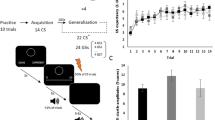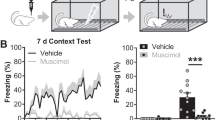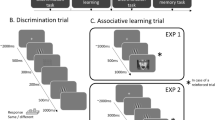Abstract
IT has been reported1–2 that the natural preference of mice for the dark can be reversed by injection of brain extracts taken from donors trained to avoid a black box. This effect was considered to represent a "transfer of learned fear". The possibility remained, however, that the apparent transfer was caused by a substance produced in response to the stress of repeated shocking rather than as a result of learning. A test was therefore carried out to see whether a similar transfer could be obtained with extracts from donors trained to prefer a white box using positive reinforcement.
This is a preview of subscription content, access via your institution
Access options
Subscribe to this journal
Receive 51 print issues and online access
$199.00 per year
only $3.90 per issue
Buy this article
- Purchase on Springer Link
- Instant access to full article PDF
Prices may be subject to local taxes which are calculated during checkout
Similar content being viewed by others
References
Gay, R., and Raphelson, A., Psychon. Sci., 8, 369 (1967).
Ungar, G., Galvan, L., and Clark, R. H., Nature, 217, 1259 (1968).
Author information
Authors and Affiliations
Rights and permissions
About this article
Cite this article
FJERDINGSTAD, E. Chemical Transfer of Learned Preference. Nature 222, 1079–1080 (1969). https://doi.org/10.1038/2221079a0
Received:
Revised:
Issue Date:
DOI: https://doi.org/10.1038/2221079a0
This article is cited by
-
Comments on the Chemistry of Scotophobin
Nature (1972)
-
Isolation, Identification and Synthesis of a specific-behaviour-inducing Brain Peptide
Nature (1972)
-
Chemical transfer of learned behavior
Agents and Actions (1970)
Comments
By submitting a comment you agree to abide by our Terms and Community Guidelines. If you find something abusive or that does not comply with our terms or guidelines please flag it as inappropriate.



